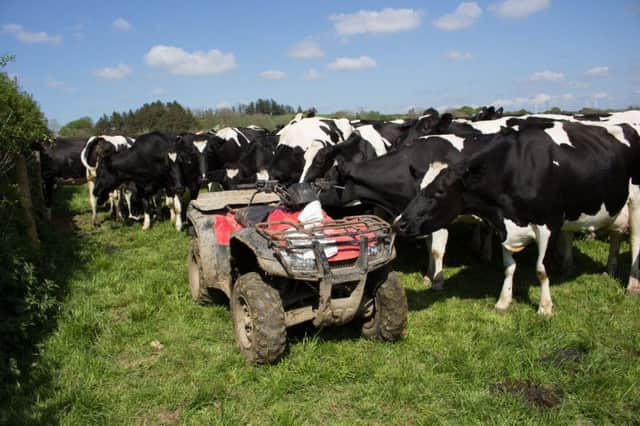Farmers urged to go organic and plant trees to slash climate impact of food


Planting more trees, peas, beans and clover on agricultural land and feeding pro-biotics to cows and sheep are among a raft of measures laid out in a new route map aimed at slashing climate emissions from Scotland’s farms.
Other key actions include improving the quality of soil, selective breeding of livestock and shifting to organic farming methods.
Advertisement
Hide AdAdvertisement
Hide AdAdopting the moves could “comfortably” reduce the environmental impacts of food production by nearly 40 per cent by 2045, according to a new report for conservation group WWF Scotland.
This exceeds the 35 per cent threshold earlier research had indicated is required for the country to achieve the government’s aim for net zero emissions by 2045.
The report highlights the most important mitigation measures that can be made with little or no changes to land use at farm level.
It also identifies system-wide changes, which could deliver significant carbon savings.
Agriculture is one of Scotland’s biggest contributors to global warming, responsible for nearly 10 per cent– around 7.6 million tonnes of carbon dioxide equivalent (Mt CO2e) – of the country’s total greenhouse gas emissions.
And Scottish farmers are directly affected by the climate crisis – extreme weather in 2017 and 2018 cost the sector an estimated £161 million in livestock losses and lower crop yields.
Experts say farming is not only part of the problem, but could play a major part in tackling rising temperatures.
The report states: “We estimated that the most promising measures could potentially deliver 2.9 Mt CO2e annually, or 38 per cent of 2017 GHG emissions, and concluded that the 35 per cent target is achievable by 2045.”
Advertisement
Hide AdAdvertisement
Hide AdTurning organic was found to offer some of the biggest emissions reductions – more than a quarter of the target with 40 per cent uptake.
Agroforestry – integrating trees on farms – could contribute a fifth of the required cuts with just 30 per cent uptake.
WWF Scotland is calling for Scottish ministers to review support for farmers to help them achieve the target.
Dr Sheila George, food and environment policy manager at WWF Scotland, said: “We need to produce food in a way that reduces emissions and locks up more carbon.
“By adapting our farming methods, Scotland could be at the forefront of the global transition to climate-friendly farming with unique export and branding opportunities arising. To get there we need to see a reframing of rural policy, financial support along with advice and training available for land managers.”
Ruth Taylor, climate change policy manager at National Farmers Union Scotland, said: “The introduction of a suite of measures to mitigate climate change will be important. It is clear that there will be no ‘one-size-fits-all’ solution.”